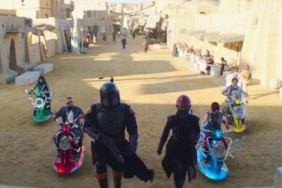Most TV dramas have one to three storylines unfolding in each episode, which are called A, B and C stories. “Lost” sometimes had a lot more than three unfolding storylines. In “Walkabout,” there are six storylines for viewers to digest. Or seven if you count Sun (Yunjin Kim) babysitting Walt (Malcolm David Kelley), but I don’t.
“Lost” was a tremendous boon for the entire cast. For Matthew Fox, this show allowed him to escape the shadow of “Party of Five,” a moderately successful Fox drama. Whether Fox will ever escape from the shadow of “Lost” remains to be seen. Because Fox embodied Dr. Jack Shepherd, the first hero of “Lost.” At this stage of the story, we didn’t see the cracks in Jack’s emotional armor and he seemed like a relentlessly selfless person.
“Walkabout” presented Jack in a different light, as he found himself the defacto leader of the survivors… and yet Jack clearly doesn’t want all of the responsibility associated with that. He shuns the idea of arranging a service for the passengers who died in the plane crash, but Jack still takes it upon himself to try to comfort Rose (L. Scott Caldwell), a woman whose husband was presumed dead in the crash. This episode was also the start of Jack’s visions of his dead father, Christian Shepherd.
Meanwhile, Kate (Evangeline Lilly) and Sayid (Naveen Andrews) share a subplot as she tries to help him place a device that may allow them to locate the outgoing signal that’s blocking their attempts to call for help. Of course things don’t go as planned, but their actions demonstrated their desire to escape the island. At the same time, Claire (Emilie de Ravin) stepped up to handle the memorial for the fallen passengers. And even Sawyer (Josh Holloway) felt moved to contribute to Claire’s efforts.
The only plotline in this episode that doesn’t quite work is Shannon’s (Maggie Grace) emotional manipulation of Charlie (Dominic Monaghan) just to prove a point to her step-brother Boone (Ian Somerhalder). It doesn’t play for laughs, which may have been the intended response. In retrospect, it’s not surprising that Shannon and Boone were among the first survivors to be written out of the show.
But the reason that “Walkabout” stands above all other episodes of “Lost’ is the A and B story of John Locke (Terry O’Quinn). Prior to “Lost,” O’Quinn was best known for starring in the first two Stepfather movies and he was a reliable supporting player in “Millennium,” “The X-Files” and numerous movies and TV shows. It wasn’t until “Lost” that O’Quinn got a chance to shine in a leading role on TV.
On the island, Locke is basically the Batman that the survivors need. There’s no food, but Locke appears to be a well armed hunter who is ready for anything that the island throws at him. But in the flashbacks, we learn that Locke is a fraud. Locke is not this fearless alpha male, he’s a lonely man who is struggling to deal with a harsh daily life.
One of the things that really gets the audience on Locke’s side in the flashbacks is Randy (Billy Ray Gallion), Locke’s cruel manager who never seems to get tired of tormenting him. I think a lot of us have had a Randy in our lives. He’s the annoying super douche who always finds new ways to make his victims feel like shit. Randy is a dude who deserves to be hit by a falling meteorite. It’s a shame that he wasn’t inside Hurley’s (Jorge Garcia) restaurant when that actually happened on the show.
To compound things for Locke, we learn that his girlfriend “Helen” is actually a phone sex operator with whom he has become infatuated. Locke doesn’t call Helen for sex talk, he just wants companionship and he misreads her feelings for him. When the truth about their relationship is made clear, Locke is heartbroken. He’s just a sad and pathetic man compared to who he is on the island.
The masterstroke of this episode comes after all of the other plotlines have come to a head. Shortly before the plane crash, we find Locke in Australia, demanding to be allowed the chance to experience a Walkabout for himself. Only Locke is denied because he’s paralyzed from the waist down, leading Locke to angrily shout “don’t tell me what I can’t do!”
Somehow, the island healed Locke and restored his mobility, as seen in a flashback to the crash as Locke is overjoyed amidst a dangerous situation. Locke wasn’t kidding when he told Walt that the island was magic. Locke was living proof of that.
For a lot of “Lost” fans, this was the signature scene of the show. It was simply a transcendent moment that floored the audience and suggested that anything was possible on the island.
“Walkabout” crystallized “Lost” in the hearts of the audience and it helped power the show through some occasional rough patches. Make no mistake, “Lost’ had plenty of great episodes. “Walkabout” is just the best of the best. It’s the Best Episode Ever. And if the series finale had been able to recapture the heart and wonder of “Walkabout” then “Lost” wouldn’t have so many detractors today.
There is a sizable group of “Lost” fans who claim that the series finale ruined the show for them. I am not one of them. Despite some misgivings I have about the sideways reality of the final season, I’ve never forgotten that “Lost” was a fantastic ride for almost its entire run. For a show that was largely made up on the fly, “Lost” was amazing. And “Lost’ has more than earned its place as one of the greatest TV shows of all time.








